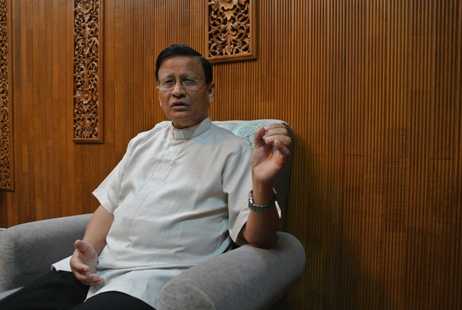
Myanmar Archbishop Charles Maung Bo of Yangon says proposed laws on race and religion would restrict freedom of religion and democracy.
Myanmar Archbishop Charles Maung Bo of Yangon said proposed laws on "the protection of race and religion" are unnecessary, and warned against the state interfering in an individual's right to choose their religion.
Archbishop Bo told ucanews.com that such rules risked dialing back religious freedom in Myanmar at a time when citizens are gaining freedoms in most other areas.
A nationalist movement led by Buddhist monks last year had lawyers draft a package of legislation to regulate interfaith marriage, religious conversion and population growth, backed by a petition with more than 1.3 million signatures. The government of the country's reformist president, Thein Sein, is now drafting laws based on the proposal, which is targeting the Buddhist-majority country’s Muslim minority.
At the heart of the movement, dubbed 969, is an apparent fear that Buddhist women are being forcibly converted to Islam, and that Muslims are growing in number and influence. Inter-communal violence has displaced tens of thousands of people in Rakhine State, where the stateless Rohingya Muslim minority lives, and elsewhere since mid-2012. The vast majority of those displaced are Muslims.
The most controversial law being proposed would require a Buddhist woman to have her marriage sanctioned by local authorities, her parents and in-laws before marrying a non-Buddhist. Her husband also would be required to convert to Buddhism.
Speaking at his Yangon residence, adjacent to the city's St. Mary's Cathedral, Archbishop Bo said such matters should not be legally restricted.
"Suppose if somebody wants to marry a Muslim, he would have to become a Muslim according to the [religious] laws. If he marries a Catholic girl, he must become a Catholic," he said. "But it's different. This is the law of the religion. But they want to enforce it in the state law."
New York-based Human Rights Watch last month called for Thein Sein and Myanmar's Parliamentary Speaker Shwe Mann to reject the proposal, saying it contained measures "seriously jeopardizing women’s autonomous decision making and their freedom to start a family of their choice".
"It is shocking that Burma is considering enshrining blatant discrimination at the heart of Burmese family law," Brad Adams, Human Rights Watch's Asia director said in a statement. "This law would strip away from women their right to freely decide whom to marry, and would mark a major reversal for religious freedom and women’s rights in Burma."
The Attorney General’s office and government ministries are expected to come up with final drafts of the package of laws in May. Since he has not spoken about the issue publicly, it is unclear how strongly Thein Sein supports the laws on "protection of race and religion," but the large number of signatories suggests opposing it could be politically difficult with a landmark general election expected in late 2015.
However, Myanmar’s popular opposition leader, the Nobel Peace laureate Aung San Suu Kyi, who has come under international criticism for not strongly condemning anti-Muslim sentiment in the country, has called the proposed law a "violation of women's rights and human rights".
Also proposed is a measure to legally regulate conversion from Buddhism to another religion.
"Conversion is an individual freedom," Archbishop Bo said. "They cannot force anybody to become one religion or the other. Even the pope said we have to respect even the atheist who doesn’t profess any religion. I think we have to respect the conscience of each one. We cannot force them to join one religion or the other; not the parents, not the state, not the monks."
The proposed laws would also attempt to restrict population growth. The Myanmar government has already enacted policies aimed at limiting Rohingya families to two children.
"All these areas I don’t think anyone can impose on anyone," said Archbishop Bo, adding that such laws could jeopardize new freedoms, mainly the newfound ability of Myanmar citizens, with some restrictions, to hold public demonstrations.
"If we restrict these, it’s not democracy," he said.
The drafters also want laws to limit the number of wives a man can take, even though polygamy is already illegal under Myanmar law.
Archbishop Bo also warned of an increasing trend in Myanmar for hate speech, which is most commonly directed against Muslims. He said he had spent time in a rural area on the outskirts of Yangon recently and heard a Buddhist monk preaching anti-Muslim sermons though a loudspeaker day after day.
"This hate speech is occurring all over the country," he said, singling out U Wirathu, a prominent Buddhist monk and the leader of the 969 movement.
He offered his support for a new campaign called Panzagar, or "flower speech," founded this month by Myanmar blogger Nay Phone Latt, which aims to tackle hate speech in Myanmar, particularly on social media.
"Even the ordinary simple Buddhists are becoming definitely prejudiced against the Muslims. So if anything happens, they always go for violence. So I think the government should move against this hate speech," he said. "So far the authorities have not made any statement on this hate speech."
The archbishop said he would use his sermons this Easter to call for more religious tolerance in Myanmar, adding that a positive approach to promoting religion was needed.
"The religious leaders must preach the goodness of their own religion in order to attract them. It’s a sort of negative mind for the Buddhists to preach against," he said.
"Preaching the goodness of one’s religion, or holiness of one’s religion, should be emphasized, rather than attacking the other religion. If we have respect for the other religion, it’s positive."


